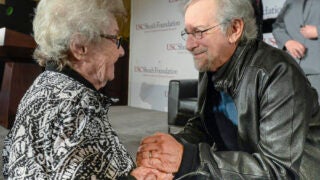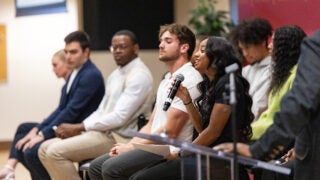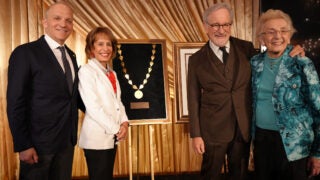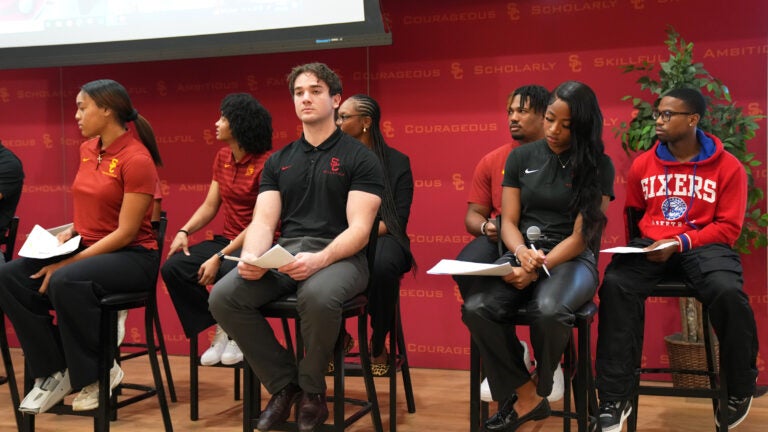
USC student-athletes reflect on their experiences visiting historical sites of the Holocaust and Civil Rights Movement. (Photo/B. Becton)
USC student-athletes recall life-changing trips at Stronger Than Hate event
USC Shoah Foundation and the Big Ten Conference provide Trojan athletes with the opportunity to visit historical sites of the Holocaust and the Civil Rights Movement.
It has been more than six months since Matteo Mitchell, a member of the USC track and field team, walked through the gates of the Auschwitz concentration camp. To this day, he still gets goosebumps.
“You could really feel the evil aura of this place,” Mitchell said, addressing fellow students, staff and faculty in the Founders Room at the Galen Center.
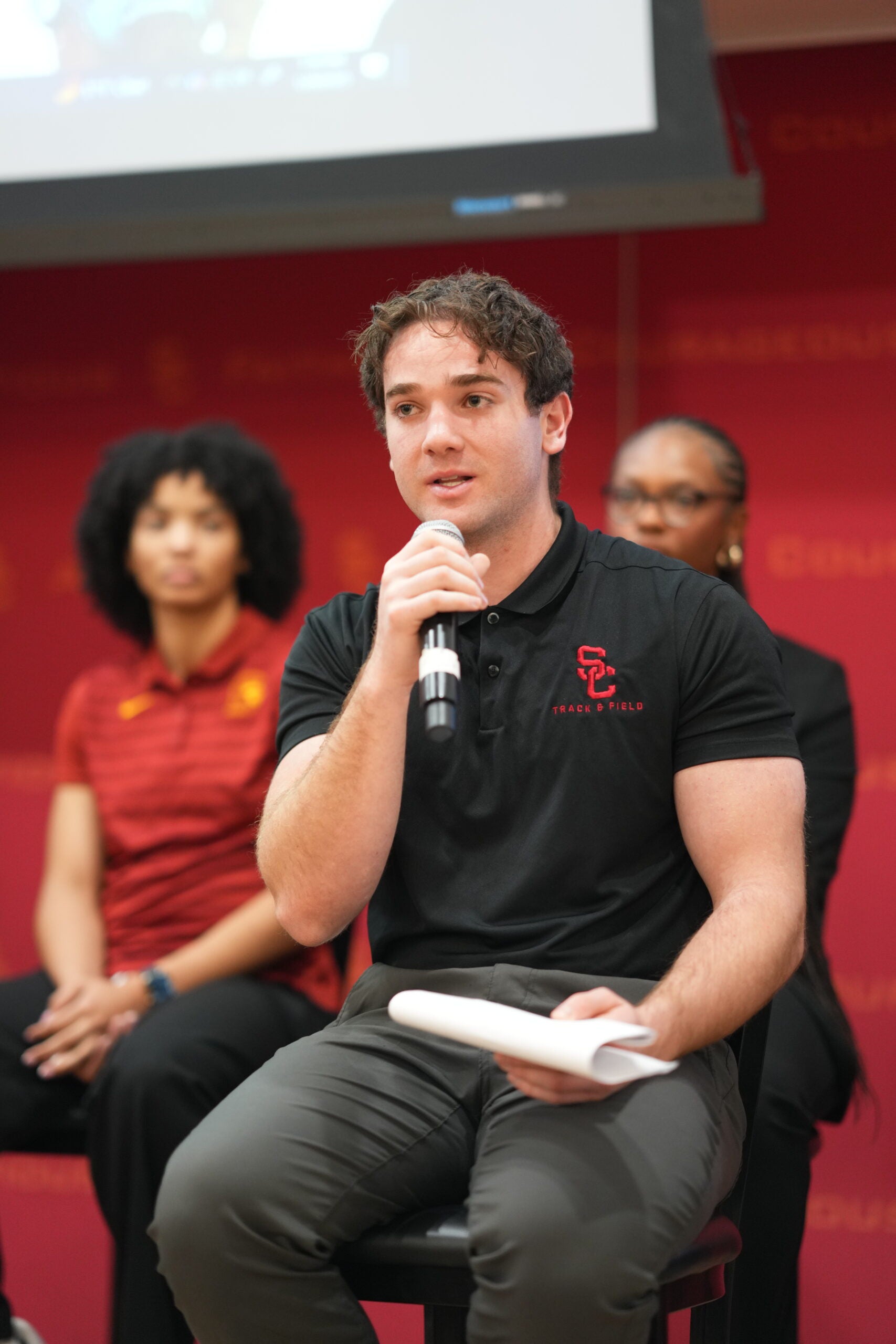
Mitchell was part of a panel of Trojan student-athletes who shared their experiences as part of “Stronger Than Hate: Student Athletes as Agents of Change,” a presentation and discussion of their recent visits to historical sites of the Holocaust and the Civil Rights Movement.
USC Shoah Foundation — The Institute for Visual History and Education sponsored the trip to Poland as part of its Leadership Summit, sending USC student-athletes to witness these sites firsthand and to connect with Holocaust specialists and academics. The Big Ten Conference sponsored journeys to Selma and Montgomery, Ala., as part of its “Big Life Series.” Though the locales were an ocean away and sponsored by different groups, the goal of the visits remained the same: to empower and inspire student-athletes to be confident in opposing all forms of hate and bigotry.
For Mitchell — who is Jewish — the trip to Auschwitz was both a chance to gain a greater understanding of the atrocities committed against his people and a way to connect to his family. This is Mitchell’s second trip to Poland with the Leadership Summit. During his first visit, he found members of his own family as he turned the pages of a massive book filled with names, dates of birth and places of death.
“Being Jewish, I know a lot about the Holocaust, but it doesn’t put it into scale until you’re actually there — this place is literally bigger than USC’s campus,” Mitchell said. “Being able to connect with my family was definitely life-changing for me.”
Whether they traveled to the American South or Central Europe, students said they shared a deeper understanding of their role in creating a more just and humane world. For USC President Carol Folt, students’ willingness to deepen their knowledge about some of the most infamous atrocities our world has ever seen is an important step in creating a better future.
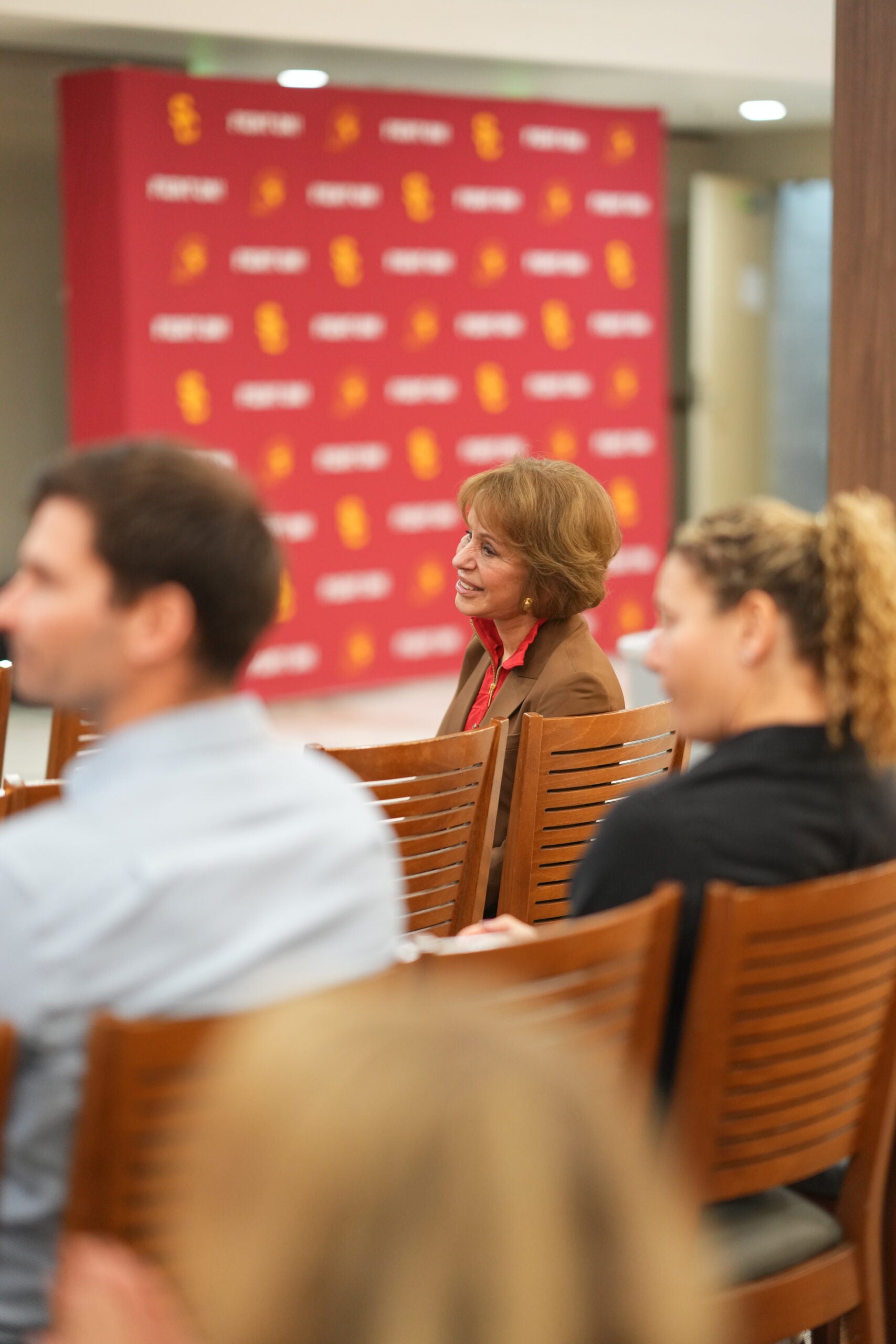
“There’s no way you can learn all this in a book,” Folt said in her remarks at the event. “These are things that you’ve learned through experience, and now when you tell your story you’ll have a huge impact on people.”
Hate toward one is hate toward all
Bryce Brock didn’t know what to expect in Poland. The junior sprinter thought the trip would be a bonding experience with teammates and fellow student-athletes, but he didn’t anticipate how strongly they would connect over what they saw. From the moment he walked through the gates of Auschwitz, he said he knew the experience would be with him forever.
“I was just upset, and I couldn’t figure out why I was so upset until you realize everything that happened there,” Brock said. “We talk about physical ancestors, but don’t talk about spiritual ancestry, and how things that happened before can still reside in those spaces.”
For Alyssa Hope, a sophomore jumper on the USC track and field team, one of the biggest surprises was hearing that Auschwitz imprisoned, in addition to Jewish people, anyone who spoke out against the Nazi regime or was deemed a threat — including Poles, Jehovah’s Witnesses and gays. Hearing about how neighbors turned on each other really struck a chord with her.
“I just want to encourage us to love one another,” Hope said.
Prior to flying to Poland, the student-athletes visited Washington, D.C., and heard from Holocaust survivors in person and through video interviews from the USC Shoah Foundation archives. It’s an experience Hope wants for the next generation of student-athletes, so that they can continue to learn from the past and create a better future.
“Growing up, I was always told that athletes are leaders, and one quality I think that’s really important that we used to have is empathy,” Hope said. “Watching the Shoah Foundation archives really helped expand my own capacity to learn what it means to care about other people.”
Hope added that she intends to carry the lessons she learned from this experience forward in her own life. “It’s important, as individuals, to keep history alive and keep fighting for what’s right,” she said. “These battles didn’t end with slavery ending. They didn’t end with the Civil Rights Movement.”
Reliving the Civil Rights marches
Last year’s journey was Jalaysiya “Laysi” Smith’s second trip to Selma and Montgomery with the Big Ten’s “Big Life” series. The senior hurdler on USC’s track and field team said she felt compelled to return to deepen her knowledge of the Civil Rights Movement.
“Being there, walking the same bridge that my ancestors walked, and being in those same spaces really did something to me,” Smith said. “I was invited to come back as an ambassador, and my role was to help engage other student-athletes and teach them about what I learned — and also help them digest the thoughts and the feelings and the emotions that they felt.”
Other student-athletes, including USC women’s basketball player Dominique Darius, experienced both the Poland and Alabama trips. Darius said that she went to Poland knowing that her knowledge was limited. She thought that she was well-versed in the history of the Civil Rights Movement — until she stepped foot in Selma and Montgomery.
“I felt like I grew as a person, knowing more about my history as a Black woman,” Darius said. “I don’t think you could ever learn enough, though.”
Darius’ head coach, Lindsay Gottlieb, said experiences like these are what set USC and its student-athletes apart and prepare them to be the leaders of tomorrow.
“It never feels like they’re checking the box — it feels like they’re really taking part in something,” Gottlieb said. “The college age is such an inspiring time. I do believe they’re the ones who are going to change things, and I do believe that they’re the ones who are going to care about where our world goes.”

